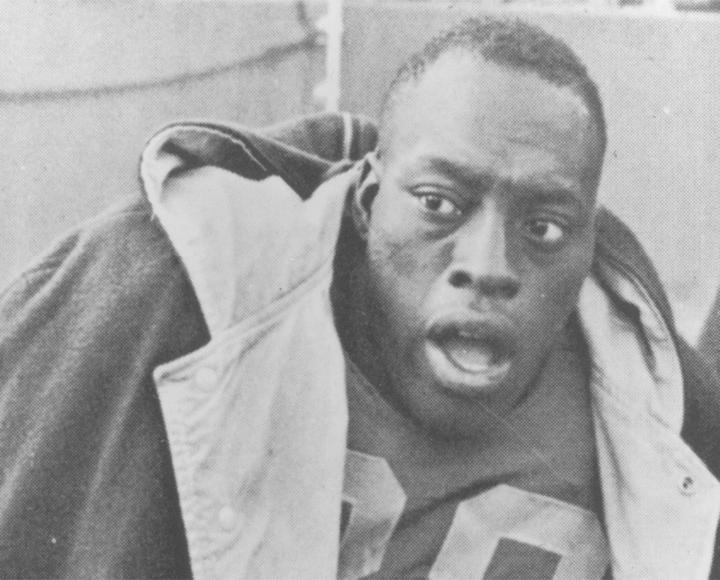
Subscribe to Pittwire Today
Get the most interesting and important stories from the University of Pittsburgh.When Bobby Grier took to Tulane Stadium for the Sugar Bowl in New Orleans on Jan. 2, 1956, he carried far more than a football. He carried the weight of history.
As the first African American to play in the storied bowl game, Grier (BUS ’57) stood at the intersection of sports and civil rights, his every step charged with meaning. Seven decades later, his legacy still reverberates in Pittsburgh.
The Western Pennsylvania Sports Museum at the Heinz History Center recently honored the Pitt football star’s legend with a conversation, “Game Changers: Bobby Grier.”
The panel discussion featured historians, football players and people close to Grier, including Samuel W. Black, director of the African American Program at the Heinz History Center; Rob Ruck (A&S ’77G, ’83G), a sports historian and University of Pittsburgh professor; Robert Grier Jr., son of Bobby Grier; Dorin Dickerson, a former Pitt All-American tight end; and Brandon Miree (CGS ’03), a former standout running back for the Panthers. Award-winning CNN journalist Fredricka Whitfield moderated the discussion.
“‘No Grier, no game’ still echoes,” Grier Jr. said at the panel, remembering the rallying cry that enabled his father to shatter the color line at the game. “It wasn’t just about football. It was about resilience, standing up for something greater and paving the way for progress. My dad answered history’s call with dignity.”
The 1955 football season had begun quietly enough, with Grier scoring the first touchdown of the year against California. But by December, the Panthers’ record earned them an invitation to the Sugar Bowl against Georgia Tech.
But there was a problem: Georgia’s segregationist governor demanded that his state’s team withdraw rather than play in a racially integrated game. Pitt refused to leave Grier behind — and so did the Georgia Tech students and players, who pressed for Grier to compete regardless of Griffin’s threats.
In the days before the game, in a closed-door meeting, the Pitt players voted unanimously to stand with him.
“Our coach left the room,” recalled Bob Rosborough (A&S ’57, EDUC ’67G), then a junior and a right end on the 1955-1956 team. “We decided we’d play together — white and Black. That’s when Pitt Chancellor Charles Nutting sent the telegram: ‘No Grier, no game.’”


Unfortunately, Pitt lost the game 7-0, with the only Georgia Tech touchdown coming after a controversial pass interference call against Grier, who was also the game’s leading rusher.
While a monumental moment in American history, Pitt sports historian Ruck cautioned against reducing Grier’s life to a single game. “He opened minds on the field, but also in everyday life,” Ruck said. “He played sports, served in the armed forces, worked in the steel industry. These are all arenas where we learn about each other. These are arenas for change. People don’t give up entrenched views quietly, but Bobby helped to change that.”
For former Pitt players Dickerson and Miree, Grier’s story also carries lessons for today.
“Football is the ultimate team game,” said Dickerson. “What Bobby and his teammates did show that everybody has to win together.”
Miree added: “To play well, to make change, you need trust. That’s what Grier and his teammates built.”
He never saw himself as a hero, Grier Jr. recalled of his father, who died in July 2024 at 91 years old. “He saw himself first as a father. But he knew what his team did was important.”
Grier’s stand, panelists agreed, is not just a chapter in sports history but a reminder of the courage it takes to answer history’s call.
“Sometimes you’re asked to take on a role you didn’t ask for,” Dickerson said. “Bobby stepped up.”
Soon, more people will have an opportunity to celebrate Grier’s legacy.
A Nov. 21 event at the College Football Hall of Fame is being planned to celebrate the legacy of the 1956 Sugar Bowl and Grier. Hosted by the Pitt Alumni Association (PAA), the gathering in Atlanta is part of PAA’s Pitt at Georgia Tech weekend as Pitt football plays at Georgia Tech, the same school Grier and the Panthers faced in that historic Sugar Bowl.
Learn more and register online for the celebration and PAA’s pre-game tailgate.
Photography by Tom Altany. Panelists for a recent conversation on the legacy of Pitt football legend Bobby Grier included (seated, from left) Samuel W. Black, director of the African American Program at the Heinz History Center; Rob Ruck, professor of history in Pitt’s Kenneth P. Dietrich School of Arts and Sciences; Bobby’s son Rob Grier Jr.; and former Pitt football standouts Dorin Dickerson and Brandon Miree. The discussion was moderated by CNN journalist Fredricka Whitfield (far left).


